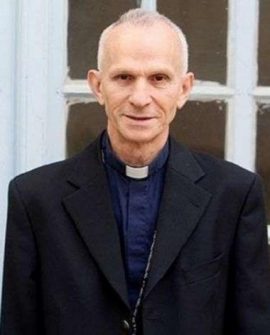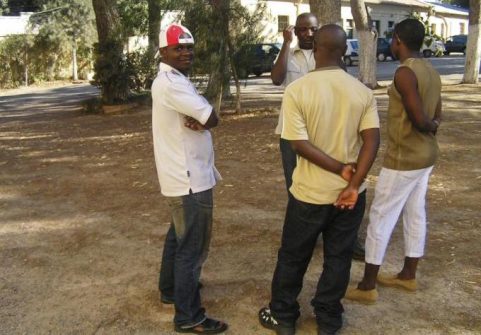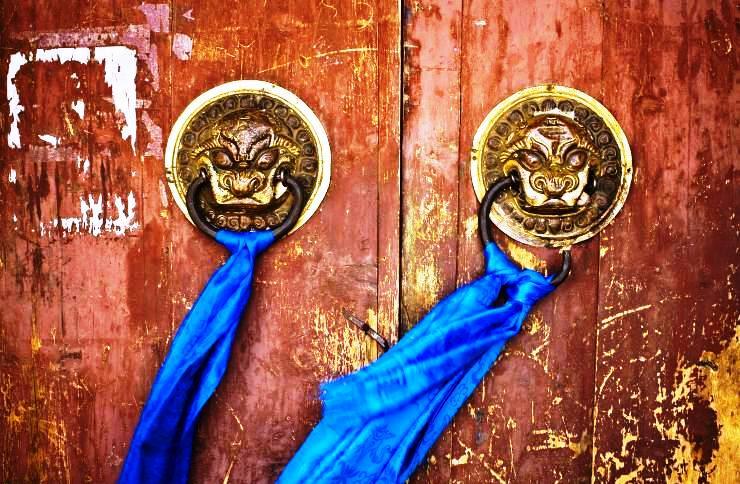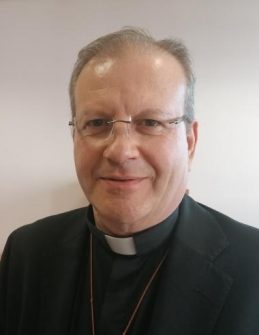The Water in Olive Lake.
Long, long ago, a mother and her son lived by Olive Lake below Olive Mountain. The mother was very, very old and could not work anymore. Her young son rented a plot of land from the landlord and laboured on it all the year round. But despite his industry year in and year out, their life never improved; they never had enough food or clothing.
The young man began to marvel: “Why is it that the water in Olive Lake, that doesn’t stay still, is yet turbid? Why is it that, in spite of all my hard work, I still am so poor?”
Then he heard that one could seek advice from the God of the West in one’s difficulties and decided to go there and find an answer to his questions. He was not one to let a matter rest, once he had decided on it. So he made sure that the stocks of fuel, rice, oil and salt would last his mother for some time. Then he set off the very next morning.
For seven times seven days he walked, his face turned towards the west. Parched with thirst, he knocked at a hut and asked for a drink. The kind old woman inside invited him into her house and treated him hospitably. Then she asked him: “Why is it, young man, that you’re panting so? Where are you hurrying to?” “I am going to the Western Heaven,” he replied, “to ask the God of the West why the water of Olive Lake, although it never stays still, is yet turbid and why I labour all the year round and am still poor.”
When the old woman heard this, she gladly seized the opportunity. “Will you find out something for me too? I have a daughter, eighteen years of age, who is very beautiful and clever. Yet she has never spoken a word in all her life! Would you ask the God of the West why she cannot speak?” “I shall ask for you,” the young man promised readily.
After a night in the old woman’s hut, he walked on towards the west again, for another seven times seven days. At the end of that period, he felt very tired. As it was getting dark, he knocked at the door of a hut.
An old man opened and invited him in. After he had put some food and drink before him, he inquired: “Where are you going in such a hurry that you’re sweating all over?” “I am going to the Western Heaven to ask the God of the West why the water in Olive Lake doesn’t stay still and yet is turbid, and why is it that I labour all the year and am still poor,” the young man answered. Thereupon the old man said with a laugh: “How very fortunate! I too have a question.
There’s an orange tree in my orchard, with leaves a lush green. But why doesn’t it bear fruit?” “I shall be glad to find out for you,” the young man promised readily. The next day, he continued his journey. Suddenly he came to a wide, wild river. There was no ferry. How could he get across? He sat down on a big stone by the riverside, wondering what to do. Suddenly, a gust of wind covered the sky with dark clouds and sent the river roaring. After a while, the storm subsided and a beautifully coloured cloud appeared in the sky.
From the rushing river, a dragon called up: “Hey, young man! Where is it that you’re travelling to with such speed?”
“I am going to the Western Heaven to ask the God of the West why the water in Olive Lake doesn’t stay still and yet is turbid, and why is it that I labour all the year and yet am so poor,” the young man replied. “Then you can ask a question for me, too. I harm neither men nor animals, and I’ve chastised myself for a thousand years here. Why can’t I rise up to Heaven?” “I’ll be sure to ask this question for you,” the young man promised the dragon readily, and then the dragon carried him across the river on his back.
After the young man had gone westward for more than a day, he came to a big, old city with a palace. When he asked the gate man where the God of the West lived, he was taken to a magnificent hall in the palace. In the middle of this hall sat an old man with silvery hair and beard. This must be the God of the West, thought the young man. But before he could utter a word, the old man addressed him smilingly: “What is it you come here for, young man?” “I have four questions to which I would like you to give me the answers.”
The God of the West assented, but first told him: “Our rule here is: ask one and not two; ask three and not four; ask only odd but no even numbers of questions. Now you have four questions. Think it over and decide which one to omit!” The young man was hard put to it to decide. He thought the questions over and over again. His own question was very important. But the three other questions were also important. Perhaps he’d better put other people’s business before his own, since he was allowed to ask only three questions and not four. So he decided to give up his own question and ask the three others.
When they were answered satisfactorily, he went away happily from the palace of the God of the West. At the riverside, the dragon was waiting for him: hat about my question?” “The God of the West said you must do two good deeds before you can rise up to Heaven.” “What deeds? Tell me quickly!” the dragon urged him.
“Carrying me across the river is one. The other good deed will be to knock off the pearl which shines on your head at night.”
Again the dragon carried the young man across the river and then asked him to help knock the pearl off. Two horns shot out from the dragon’s head and he rose up towards Heaven immediately. When he was piercing the clouds, he called down to the young man: “Take the pearl as my reward for you!” The young man took the shining pearl and went on his homeward journey. When he arrived at the old man’s place, the first question asked was: “Did you do as you promised?”
“Yes, I did. And the God of the West wants me to tell you that nine jars of gold and nine jars of silver are buried at the bottom of the pool in your orchard. If you dig the jars out and water the orange tree with the water from the pool, the tree will bear fruit.” The old man called his son and together they scooped the water out of the pool. Then they started to dig, the young man helping them. They dug for some time, but neither gold nor silver appeared. But they did not give up. They dug deeper and deeper and there – they found nine jars of gold and nine jars of silver! As soon as they had taken the jars out, clear water sprang from the bottom of the pool and filled it in a moment.
The old man watered the tree with the clear water, as he had been advised. And as soon as the water was sprinkled on it, every branch of the tree bore fruit. Soon the whole tree was laden with golden oranges. The old man was so happy that he didn’t know what to say. The young man was asked to stay for a couple of days more and rewarded with a lot of the gold and silver. Then the young man took his leave and went on till he arrived at the old woman’s house, carrying with him the pearl that shone at night and the gold and the silver.
The old woman ran out to meet him and inquired: “Have you done what I asked you to do?””Yes,” he answered. “The God of the West wants me to tell you that your daughter will be able to speak when she sees a young man after her own heart.”
The girl came in while her mother was talking to the young man. She blushed like a rose when she caught sight of the young man and smiled shyly. Then she asked slowly: “Who is this, Mother?”
The old woman was so happy that she reeled in her excitement, clasping the girl in her arms and shedding tears of joy. Since the young man was so brawny and honest, she advised her daughter: “This is a day of good omen, my child, since you spoke your first words today. Let it be the day of your marriage!”
The young man then took leave from the old woman and went happily towards home, with his pearl that shone at night, his gold and silver, and his young bride.When he reached home, he found that his aged mother had cried her eyes blind with longing for her son. The young man wanted his mother to see how clever and beautiful her daughter-in-law was, but all she could do was to feel the girl’s smooth cheeks. He also wanted her to see the gold and silver.
But she could only listen to the clinking of the metal. Then he took out the pearl and waved it before her eyes. But no matter how the pearl shone, all the mother saw was darkness.
The young man felt very unhappy. He thought fervently: “If only my mother could see!” At the very thought, his mother’s eyes became seeing again.The young man was amazed that his wish was instantly fulfilled. Waving the pearl, he thought again: “If there were no wealthy men in the village, the poor would not be oppressed!” And it did happen that all the wealthy men died.
The young man then understood that the pearl was not an ordinary pearl that it could not only shine at night, but grant people’s wishes.
From that day on, the water in Olive Lake was no more turbid and the life of the poor became sweet as honey.
A Story of the Han People – China
















































